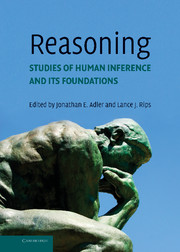Book contents
- Frontmatter
- Contents
- Preface
- List of Contributors
- Introduction: Philosophical Foundations
- PART I FOUNDATIONS OF REASONING
- PART II MODES OF REASONING
- PART II INTERACTIONS OF REASONING IN HUMAN THOUGHT
- Section 9 Reasoning and Pragmatics
- Section 10 Domain-Specific, Goal-Based, and Evolutionary Approaches
- 39 Domain-Specific Knowledge and Conceptual Change
- 40 Pragmatic Reasoning Schemas
- 41 Beyond Intuition and Instinct Blindness: Toward an Evolutionarily Rigorous Cognitive Science
- 42 Use or Misuse of the Selection Task? Rejoinder to Fiddick, Cosmides, and Tooby
- 43 Why We Are So Good at Catching Cheaters
- 44 The Modularity of Mind: An Essay on Faculty Psychology
- 45 Commitment
- 46 Evolution of Inference
- Section 11 Reasoning and Cultures
- Section 12 Biology, Emotions, and Reasoning
- Index
- References
46 - Evolution of Inference
Published online by Cambridge University Press: 05 June 2012
- Frontmatter
- Contents
- Preface
- List of Contributors
- Introduction: Philosophical Foundations
- PART I FOUNDATIONS OF REASONING
- PART II MODES OF REASONING
- PART II INTERACTIONS OF REASONING IN HUMAN THOUGHT
- Section 9 Reasoning and Pragmatics
- Section 10 Domain-Specific, Goal-Based, and Evolutionary Approaches
- 39 Domain-Specific Knowledge and Conceptual Change
- 40 Pragmatic Reasoning Schemas
- 41 Beyond Intuition and Instinct Blindness: Toward an Evolutionarily Rigorous Cognitive Science
- 42 Use or Misuse of the Selection Task? Rejoinder to Fiddick, Cosmides, and Tooby
- 43 Why We Are So Good at Catching Cheaters
- 44 The Modularity of Mind: An Essay on Faculty Psychology
- 45 Commitment
- 46 Evolution of Inference
- Section 11 Reasoning and Cultures
- Section 12 Biology, Emotions, and Reasoning
- Index
- References
Summary
Philosophical Skepticism
Jean-Jacques Rousseau begins his discussion of the origin of language in A Discourse on Inequality by toying with a paradox:
[A] substitution of voice for gesture can only have been made by common consent, something rather difficult to put into effect by men whose crude organs had not yet been exercised; something indeed, even more difficult to conceive of having happened in the first place, for such a unanimous agreement would need to be proposed, which means that speech seems to be absolutely necessary to establish the use of speech.
Rousseau moves on without taking the problem seriously, but the paradox echoes through modern philosophy of language. How can we explain the genesis of speech without presupposing speech, reference without presupposing reference, meaning without presupposing meaning? A version of this paradox forms the basis of Quine's attack on the logical empiricist doctrine that logic derives its warrant from conventions of meaning – that logical truths are true and logical inferences are valid by virtue of such conventions. Quine raised the general skeptical question of how conventions of language could be established without preexisting language, as well as calling attention to more specific skeptical circularities. If conventions of logic are set up by explicit definitions, or by axioms, must we not presuppose logic to unpack those conventions?
- Type
- Chapter
- Information
- ReasoningStudies of Human Inference and its Foundations, pp. 927 - 933Publisher: Cambridge University PressPrint publication year: 2008



